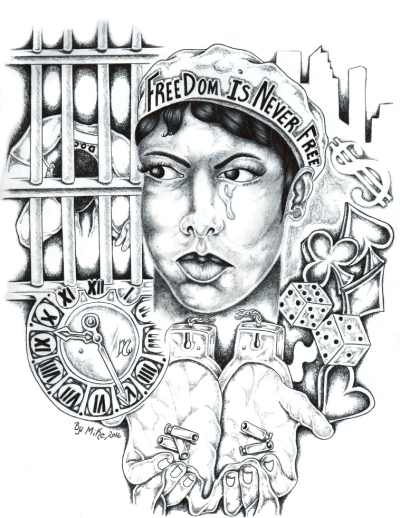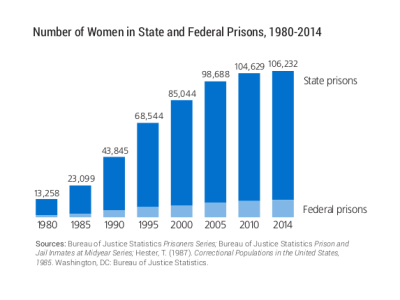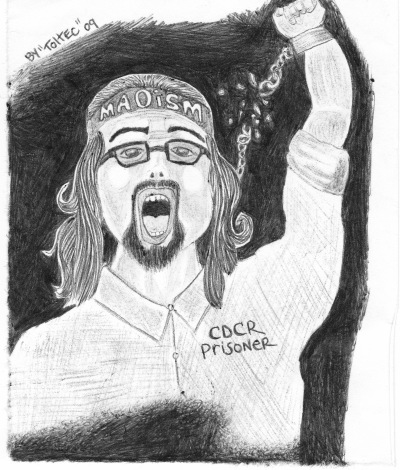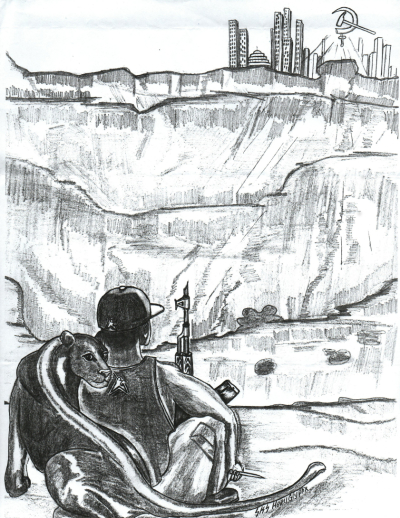
Take up Revolution not Drugs
For the second time in about one month over 900 prisoners at River North Correctional Center were given piss tests. Now if a prisoner is causing problems that indicate drug abuse, it’s perhaps reasonable to test him. But testing the entire prisoner population is a fishing expedition just hoping to catch someone.
Do the prison pigs have some admirable goal? No. They just catch people to make lives miserable by taking jobs, suspending visits, confining in seg, etc. If each test and lab fee is just $30 then the pigs spent over $54,000 in a month on the off chance they might get to punish someone for using drugs that were not prescribed.
For thousands of years humans have used mind altering substances. The “soma” of ancient India, the mushrooms of the Incas, peyote, opium, reefer, and alcohol are but a few examples. Only recently – within 100 years – have governments made the “drugs” illegal. What have these laws done to stop drug use and abuse? Nothing, as we see drug abuse at an all time high. These imperialist laws only target people, ruining lives with jail/prison while lining the pockets of the pigs with money for funding of the “war on drugs.”
A few generations ago a community had cobblers and tailors, blacksmiths and silversmiths, lamp makers and other craftspeople. The cobbler knew the people and knew the kids had warm, dry feet due to his skill. The lamp maker knew she gave them light. Today, how many of our household items are made by people we know? Our shoes are made in a factory by a kid operating a machine at exploited wages. The store with neighbors who called us by name was an imperialist casualty, destroyed by greed.
Imperialism, with its global capitalism has destroyed us. Drug abuse is merely a convulsion before death. But you can be revived. You can join us in re-structuring our communities, our form of government, our lives. That’s the call of revolution. Are you willing to die in order to feel alive? Let us use the things you make and let us make the things you need. In revolution every person has an essential part and there’s no time for addiction or drug abuse.
MIM(Prisons) responds: We like this author’s point about the waste of time that is drug abuse, and the reality that this abuse comes from the alienation fostered by capitalist culture. We sent some feedback to this author on eir first draft of this article because it took up an anti-corporate line that seemed to promote small scale capitalism rather than anti-imperialism. We know that we have much unity with this author and so suggested ey rewrite it. This rewritten version is an improvement but still we want to clarify that small scale capitalism is still capitalism. It is true that huge corporations are a product of imperialism, the highest stage of capitalism. But we don’t want to promote nostalgia for petty bourgeois businesses because that’s a reactionary approach; trying to go back to another time. Another time that of course never really existed, since even the early days of capitalism were full of war, oppression, slavery and land grabbing. As this comrade explained, we need a revolution to restructure society, and when that happens we will be able to build a new society where people engage in productive labor, which benefits their community. But it will not look like the capitalism of a few generations ago. We will eliminate the system of profit-driven work, instead allowing all people to work for the betterment of society.
In the course of our discussion with this author over eir article ey correctly noted that Walmart will die when imperialism dies in North America: “Walmart exploits laborers around the globe and is a foundation of Amerikkkan imperialism with revenue that exceeds the gross national product of many small oppressed nations. Yet its foreign laborers are paid pennies per hour. Most of their products are from India (semi-fascist regime) and China (state sponsored kapitalism) where workers are exploited. Not patronizing Walmart and not purchasing products manufactured by exploited workers is an ‘attack’ or at least a ‘stand’ against imperialism. … The corner deli or the local mom/pop shop isn’t exploiting workers in any nation.”
While this comrade is right that big corporations like Walmart are doing far more exploitation of Third World workers than small shops, we don’t agree that the corner shop isn’t exploiting workers in any nation. They are selling the same products or using the same raw materials that everyone else in the United $tates is selling/using: most of it comes from Third World labor at base. Most products in Amerikan stores are manufactured in other countries. So we shouldn’t mislead people into thinking the stuff they buy in a smaller store is exploitation-free. Further, the companies that promote “Made in America” products are not off the hook. Many of them are still buying raw materials and machinery from labor in Third World countries and just assembling products in the United $tates. Finally, most of the U.$. economy is not even productive industries. The service and financial sectors employ most Amerikans, distributing the wealth within U.$. borders, exploited from other nations via trade and extraction of real goods. There is no way to escape participating in the economy of exploitation.
So we don’t tell people to boycott Walmart because we don’t want to mislead people into thinking that they are going to make a difference under imperialism by favoring one type of exploitation over another. If the exploited workers in another country initiated an action against Walmart (or any other corporation) and asked for our support with a boycott, that would be a different story because that is not Amerikan consumerism feeling good about itself by switching where we spend our ridiculous wealth. That would be internationalist solidarity for exploited people rising up against imperialism.











